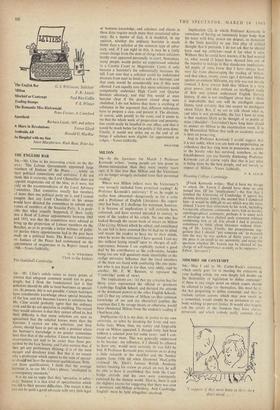MILTON
Stit,—In the Spectator for March 3 Professor Kermode writes: 'young people are less prone to Donne-intoxication than they were twenty years ago; it is also true that Milton and the Victorians arc no longer savagely excluded from their permitted reading.'
Where was Milton (where were the Victorians?) ever savagely excluded from permitted reading? At Professor Kermode's university? If so, he ought to realise how abnormal—dangerously so for a critic and a Professor of English Literature—his experi- ence has been. If I challenge his statement, however, it is because of implications it will certainly have conveyed, and have seemed intended to convey, to
most of the readers of his article. No one who has looked through the •recent book of essays on Milton (The Living Milton) which he edited, and contributed
to, can fail to have assumed that he had me in mind, and meant his readers to have me in their minds, when he wrote the sentences I have quoted. I can say
this without laying myself open to charges of self- importance, because I am explicitly named a good deal by his contributors as the arch-enemy, besides being (no one will question) made identifiable as the malign pervasive Influence that the loyal members of the team are faced with combating (the one mem- ber who is not loyal is for that, very oddly, said by another, Mr. F. W. Bateson, to represent the 'Cambridge' point of view).
The implications are: (1) that my criticism has for thirty years represented the official or dominant Cambridge English School, and dictated the attitude of the dominant powers in the other English Schools; and (2) that my criticism of Milton (or that common knowledge of me and my character) justifies the assertion that I, by savage means or otherwise, would have eliminated Milton from the student's reading if I had been able.
Implication (1) it is my duty, in justice to my own university, to rebut by invoking the brute and veri- fiable facts. When, then, my earlier and forgivable essay on Milton appeared, 1, though forty, had been without a salaried post for some years—and I con- tinued so for more. This was generally understood to be because. my influence, if I should be allowed to have any, would most certainly tit was felt) be bad. If Professor Kermode puts someone on to doing a little research in the weeklies and the Sunday papers from 1930 till when Desmond MacCarthy reviewed Mr. Eliot's famous British Academy lecture (making his review an attack on me), he will be able to have it established that both the Cam- bridge attitude and his own were consistently endorsed by the literary world. That is. there is not the slightest excuse for suggesting that there was ever a dominant anti-Milton orthodoxy. And Cambridge 'English' must be held altogether absolved. Implication (2), in which Professor Kermode is conscious of having an immensely larger body than his team with him, makes me despair, so dominant is the basic hostility to any free play of critical thought that it portends. I do not ask that he should have read my criticism—read it for what it says. Without that he could have known, if he had wanted to, what would (I hope) have shamed him out of the impulse to indulge in that slanderous implication. All pupils of mine know that I have always been very far from discouraging the reading of Milton, and that when, twenty years ago, I defended Milton against an eminent Miltonist, my title was not merely ironical. I have always held that Milton is a very great power, and that without an intelligent study of him one cannot understand English literary history. If one is not intelligent about him, I think it improbable that one will be intelligent about Donne (and certainly that one cannot be intelligent about Eliot). But, if we arc to talk about what is, and what is not, permissible, the fact I have to state is that students likely to be thought of as pupils of mine ('disciples'—'LeaVisites') have long been afraid to answer on Milton in the examination room. It is the Mummified Milton that such an academic %Amid is bent on preserving.
And to Professor Kermode I would suggest that it is not noble, when you arc bent on perpetuating an orthodoxy that has long been in possession, to point to the heretic who has survived, somehow, as the Establishment you are bravely displacing. Professor Kermode can of course reply that that is just what is being done by the best people, and not merels in respect of Milton.—Yours faithfully, F. R. I I 55 IS
Downing College, Cambridge
[Frank Kermode writes : 'Had it been my design to attack Dr. Leavis I should have done so and named him. Of his "implications"—the first that I insulted the University of Cambridge (I ignore his devious domestic irony), the second that 1 slandered him—it would be difficult to say which was the more absurd. I knew that references to his work, including favourable allusions, commonly move him to harshly autobiographical comment; perhaps it is some sort of privilege to have elicited such comment without mentioning him at all. I'm afraid I find it possible sometimes to think about literature without think- ing- of Dr. Leavis. Iinally, the preposterous sug- gestion that I should "put someone on" to research into the way he was spoken of thirty years ago in the press is an insult to my university, and raises the question whether Dr. Leavis can be cleared of the charge of self-importance as easily as he supposes:— Editor, Spectator.]






































 Previous page
Previous page